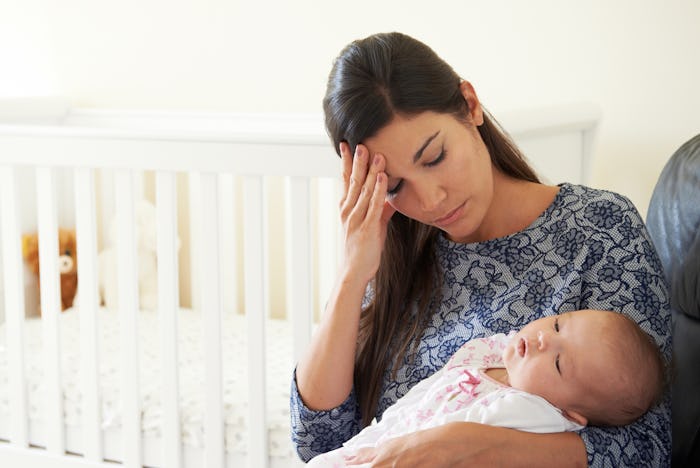Life

How Soon Can Postpartum Depression Set In?
In Breakfast at Tiffany's Holly Golightly talks about having the "mean reds," which are close to having the blues, but not quite, because they come out of nowhere. If you're a new mom, you might be suffering from a case of the "mean reds," or in more clinical terms, postpartum depression. (I don't like the term "baby blues" because it feels diminutive to me, but I am into the "mean reds.") In any case, there's a lot more research to be done on this condition, and the first question you need to know answers to is how soon can postpartum depression set in?
According to Mayo Clinic, symptoms of postpartum depression (PPD), can develop within the first few weeks after delivery, but they also can sneak up on you as long as six months to a year after birth, making PPD even more difficult to deal with.
Any new mom is likely to feel overwhelmed, find it hard to concentrate, have trouble sleeping and eating. These feelings, in the moment, feel utterly intolerable, and might lead to other icky feelings, like anxiety, sadness, mood swings, and irritability. And because you're experiencing those awful feelings, you're likely to cry and feel like sh*t. PPD is when you experience all of the above, but with extra intensity and for longer periods of time, noted Mayo Clinic. As aforementioned, PPD needs more research, but in the meantime, here are some things you should know about the condition. It's vital to document when you start noticing symptoms in order to receive appropriate treatment that will help you get better.
1You Can Get Screened For PPD
To say new moms are tired is an understatement. So how do you know if you're just tired or unmanageable fatigue is a symptom of PPD? UPI reported on new research that suggests all women should undergo PPD screenings. For more information, talk to your doctor about how often you should undergo PPD screenings.
2You Might Have A Hard Time Bonding With Your Baby
Actress Hayden Panettiere, who has been candid about her struggle with PPD, recently described one of the most devastating symptoms: having a hard time connecting with your baby. "If you think for one second that a mother wants to feel that way toward her child, you’re out of your mind," she told Yahoo Style. "It is one of the most debilitating, scary, guilty feelings that you can ever feel." According to Mayo Clinic, these particular feelings can arise any time within the first year postpartum.
3Your Ability To Think Clearly Is Severely Diminished
Huffington Post reported that a new mom experiencing PPD will have an inability to think clearly, which will interfere with her ability to perform daily tasks.
4You Experience Panic Attacks
Clinical Social Worker, and specialist in Perinatal Mood and Anxiety Disorders, Kate Kripke wrote on Postpartum Progress that panic attacks are a symptom of PPD, that might not become obvious until as late as 10 months postpartum.
5You Have Thoughts Of Harming Yourself Or Your Baby
Mayo Clinic reported that thoughts of harming yourself or your baby are common symptoms of PPD, and not to suffer these thoughts in silence. Don't feel shame, seek support immediately.
6You Have Suicidal Thoughts
Call your physician or mental health specialist when these thoughts creep in. In an emergency, call a suicide hotline number like the National Suicide Prevention Lifeline at 1-800-273-TALK (1-800-273-8255), advised Mayo Clinic. Don't keep these thoughts a secret. Tell a loved one or friend and especially your physician.
7You Are Crying Excessively
Whether you are tearful for no apparent reason, or because you think you are a bad mother, one of the tell-tale signs of PPD, excessive crying is a signal something isn't right, according to the organization Postpartum Progress.
8You Might Develop Postpartum Psychosis
According to Huffington Post, a rare condition called postpartum psychosis includes hallucinations, delusions, paranoia, confusion and attempts to harm yourself or the baby. Anyone experiencing these symptoms is urged to seek immediate treatment.
9You Might Not Know You Have PPD
Jezebel published a recent article making the point that a lot of women aren't talking about having PPD because they don't even know they have it. That's why it's so important to keep track of any "off" feelings you have and seek immediate treatment. Also, this is why item number one on this list is so important.
10Keep A Record Of Your Feelings With Dates
One of the most vocal moms suffering from PPD, Brooke Shields, penned a memoir, Down Came the Rain: My Journey Through Postpartum Depression.Although you don't have to publish your experiences, Mayo Clinic suggested that you keep a journal of your feelings so physicians can examine when the onset occurred to help you get the treatment you need.
11Don't Wait For Any Of The Above Feelings To Get Better; Get Help STAT
According to Huffington Post, about 10 to 15 percent of women reported being affected with PPD, so if you have PPD, know that you're not alone. Mayo Clinic recommended to seek treatment as soon as you experience any of the above feelings, thoughts, or behaviors.